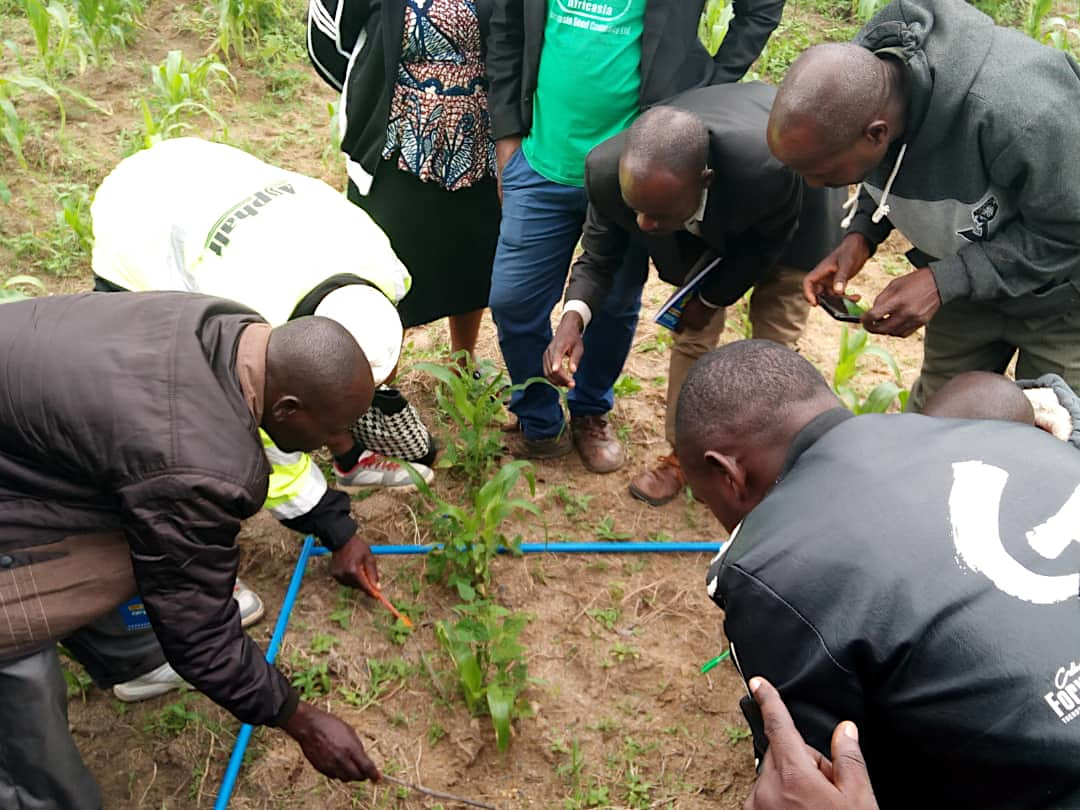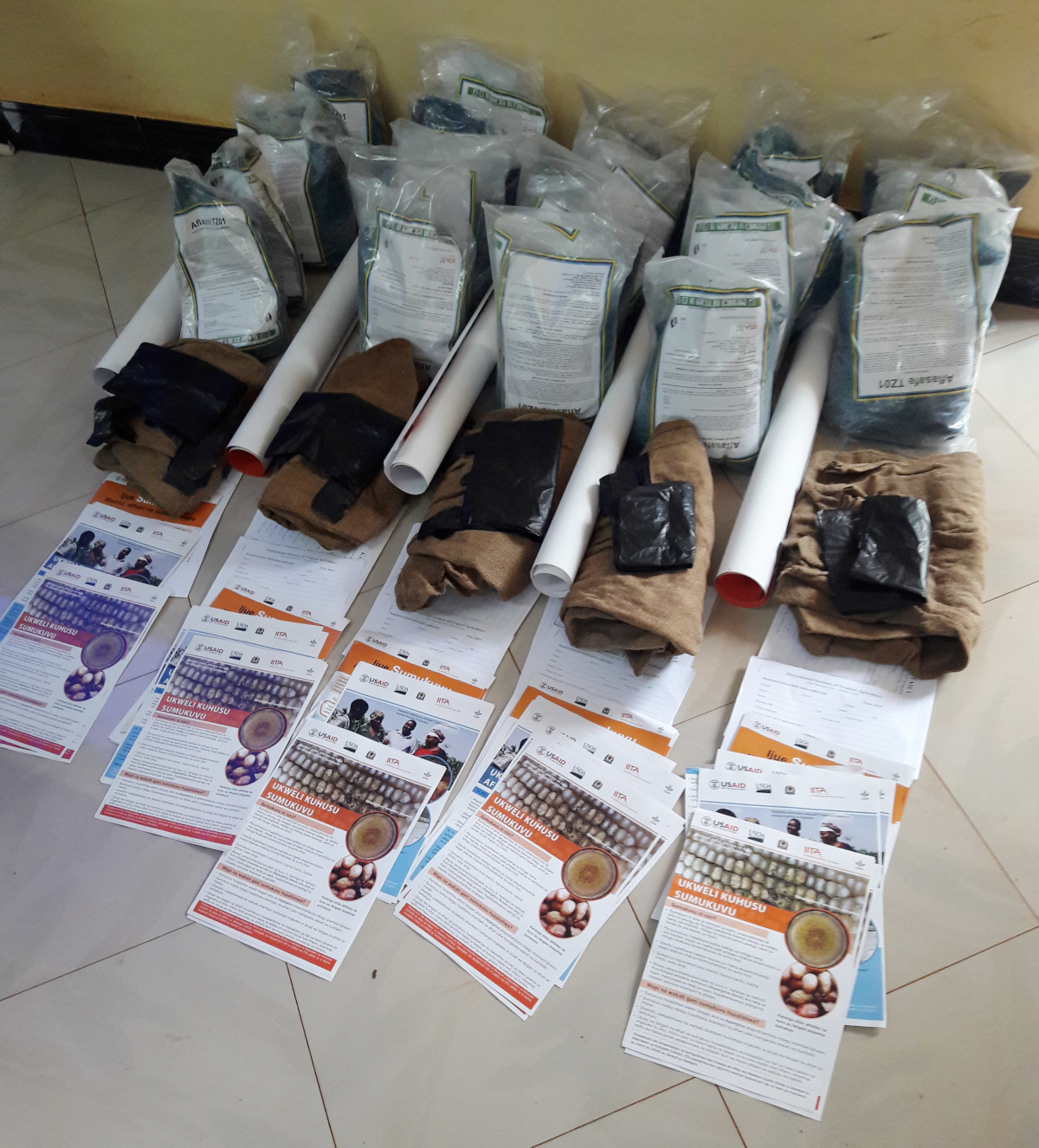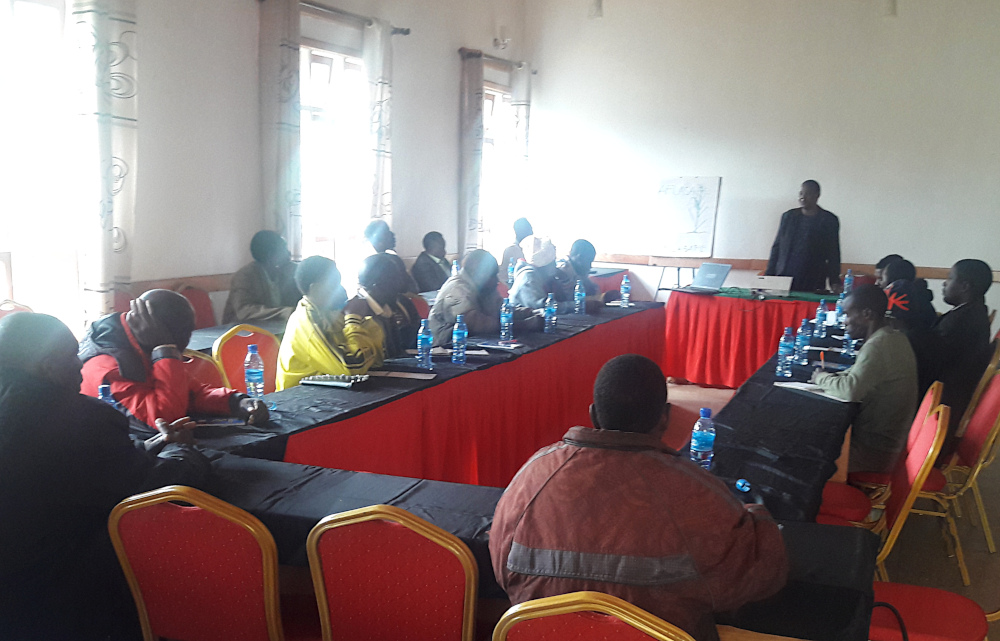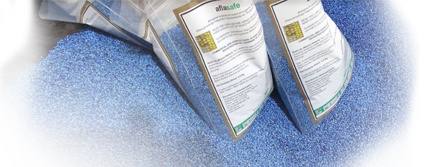“If you want to go fast, go alone. If you want to go far, go together,” says the proverbial wisdom – but by joining hands with our partners in Tanzania, we’re going both further and faster – together.

The good news on Aflasafe as a way to fight aflatoxin continues to spread in leaps and bounds in Tanzania: thousands of farmers are learning about Aflasafe TZ01, thanks to training of trainer (ToT) sessions organised by partners, to which we have the privilege of bringing Aflasafe. Their expertise and on-the-ground farmer networks, that they generously allow us to tap into in Tanzania, help us to go much further than we would working alone, and to use our resources more efficiently and effectively.
February 2019 saw the Aflasafe team taking full advantage of the short maize season, working with the Eastern Africa Grain Council (EAGC) and the Africa RISING–NAFAKA programme, alongside the Ministry of Agriculture Plant Health Unit, on training of trainers for farmer leaders and government extension agents, who would each in turn share their new knowledge of aflatoxin and Aflasafe with many more farmers and colleagues. Our new trainers learnt all they needed to immediately set up and manage their own demonstration plots on their own maize fields – live classrooms for practical training on how to apply Aflasafe and arenas to show its effectiveness at first hand. Each demonstration team of two or three trainees was expected to train at least another 100 farmers in their local community, so that our 91 attendees would get this vital knowledge to nearly 4,000 farmers within just one month.
Without our partners – and their well-established networks built up over many years and projects –we could never have reached so many farmers in such a short space of time or across such a broad geographical range. “We are based in Dar es Salaam, but our partners really know the districts where they work,” says Dr Antonio Mauro, Aflatoxin Biological Control Scientist at IITA. “For us to gather together so many farmers would be extremely difficult, but they have the know-how and structures in place. By working together we maximise the knowledge and awareness we can share, within the limits of our resources. Our partners amplify the message – exponentially.”

The Africa RISING–NAFAKA programme aims to reach farmers with agricultural technologies and practices that can boost productivity food security, and with food safety an essential element of that mission. Aflasafe fits right into their arsenal of tools, helping ensure farmers have a steady supply of safe food. Together, we organised two training days, in Iringa and Mafinga towns, in the Iringa and Mufindi Districts of Iringa Region respectively. Africa RISING–NAFAKA works in 35 different villages, each with a 0.4-hectare model farm run by a local farmer leader and supported by an extension officer – the perfect hosts for Aflasafe demonstration plots. An extension officer and a model farmer were invited from each village, with 22 agricultural extension officers and 28 farmers ultimately able to attend, giving an initial reach of at least 2,800 farmers learning about Aflasafe TZ01.
Meanwhile, in collaboration with EAGC, we held another two training days in Njombe and Songea towns, in Njombe and Ruvuma Regions. In Njombe, we trained six demonstration teams from different villages, each made up of an extension officer, a leader from a local Agricultural Marketing Co-operative Society (AMCOS), and a farmer leader, the owner of the field that would be used for the Aflasafe demonstration; in Ruvuma, there were five teams. EAGC’s focus may be a little different, but it’s wholly complementary: they aim to boost grain trade, so their interest is in helping farmers produce maize that meets international aflatoxin standards. Aflasafe’s impact in cutting aflatoxin contamination is a double win, making food both safe to eat for Tanzanians while also opening the door for external trade, thus chiming well with the goals of both partners.
“Awareness creation is crucially important,” explains Dr Mauro, with a message that’s both positive and practical. “You cannot smell and you cannot see aflatoxin, so convincing farmers that this toxin could be in their food is very difficult. We need to give them the information, but not to scare them – to show them the solution. You can’t tell people not to eat maize and groundnuts; for many people this is almost the only food they have, and so even a small amount of contamination adds up day by day. It’s easy to discuss the problem, but what we have here, Aflasafe, is the solution.” Indeed, field studies on Tanzanian farms have shown that Aflasafe TZ01 consistently reduces aflatoxin contamination in maize and groundnuts by at least 80%, and often much more.
Each training day included both theory and practical sessions on the dangers of aflatoxin, how to control it using Aflasafe TZ01 along with other good agricultural practices, and how to set up and manage an Aflasafe demonstration plot. We strongly encouraged all our participants to ask questions, clarify any uncertainties, and share their experiences – highly valuable, since these practised leaders had much wisdom to share on demonstrating and disseminating technologies on the ground. Finally, each demonstration team received everything they would need in their quest to train at least 100 more farmers over the next month: materials in Kiswahili including leaflets and brochures on aflatoxin and Aflasafe, as well as posters they could put up in their offices, villages and community centres, plus all the practical equipment needed to run a demonstration, including bags of Aflasafe TZ01 itself.

As well as members of demonstration teams, other training participants included staff from our partner organisation and District Agricultural Irrigation and Cooperatives Officers (DAICOs), who opened each training day and provided support and endorsement for Aflasafe. Overall, of the 91 attendees at the four training days, 50 were farmers, of whom 39 had maize fields that would be used as demonstration plots in 38 different villages. The weeks following the training of trainers saw the establishment of Aflasafe demonstrations in these 39 plots across the three regions – setting into gear the training of at least 3,800 farmers on aflatoxin and Aflasafe.
And the training train travels on as we look ahead to quarter two, with no sign of running out of steam. We’ll be nurturing our existing partnerships, supporting and following up on the new demonstration plots, and attending some of Africa RISING–NAFAKA’s own field days to train more farmers on aflatoxin and Aflasafe. Meanwhile, in maize-growing areas where we have not yet found a partner organisation, we are working with DAICOs to identify local lead farmers and organise similar training of trainer sessions.
With thousands of farmers now armed with knowledge they need to use Aflasafe and excited to give it a try, and strong support from the Tanzanian government, we now need to make sure the product is available. In one more sneak peek at our next issue, we anticipate that next maize season we will have large-scale quantities of Aflasafe available to farmers on the market, working with our new distribution partner – more on this next issue!
The Aflasafe journey has always had collaboration at its core, and now, as we work to commercialise Aflasafe on a large scale and pass the technology on to local manufacturers and distributors, partnerships are even more imperative than ever in all we do. By strategically working with partners with established networks, we are able to reach thousands more farmers with our critical and life-saving message on Aflasafe’s anti-aflatoxin protection, and why they need it.
LINKS
- Resources from the Eastern Africa Grain Council – good practices, standards, grain trade and more:
- Farmer’s guide: maize (Kiswahili)
- News: EAGC to launch standards for staple foods
- EAGC Ratin | Post-harvest losses: EAGC equips maize farmers with skills to cut post-harvest losses, boost yields
- Farmers’ training manual: Understanding structured trading systems
- Presentation: Sanitary and phytosanitary interventions by the Eastern Africa Grain Council
- Previous news from Tanzania:
- Keep up with the latest on Aflasafe in Tanzania










